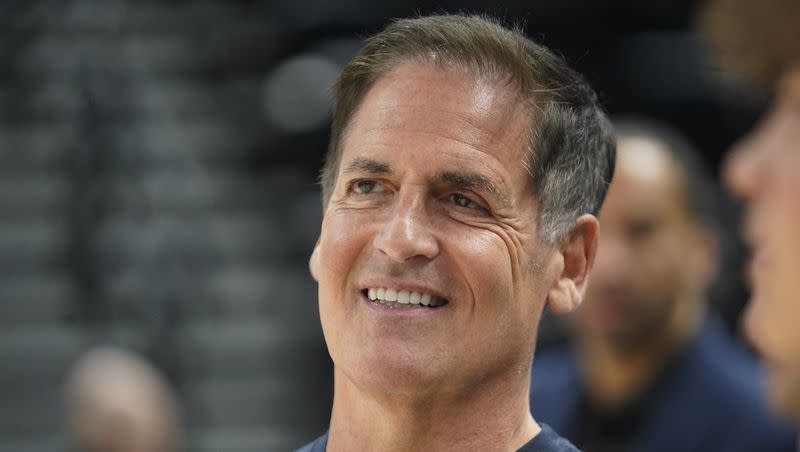Mark Cuban and Vivek Ramaswamy debate school choice, education funding on social media

- Oops!Something went wrong.Please try again later.
- Oops!Something went wrong.Please try again later.
Vivek Ramaswamy, a Republican presidential candidate for 2024, wants to abolish the Department of Education but Dallas Mavericks owner and “Shark Tank” investor Mark Cuban does not think it's a good idea.
The two entered into a debate on X, formerly known as Twitter, over the weekend about Ramaswamy’s ideas on education, including his support for school choice.
It began when Ramaswamy, a businessman, said Saturday he that he will unveil his plans for dismantling the Education Department in his speech in Washington, D.C., on Sept. 13.
Cuban responded less than an hour later. He said Ramaswamy wasn’t focused on improving the federal agency with a results-driven plan that would improve education while lowering costs.
Instead, Cuban, who often gets into debates online, said he wants the U.S. “to be a deadbeat country that doesn’t pay its bills or fulfill its contractual obligations committed to by the 3 letter agencies you would close and instead spend that money on hiring ten thousand+ lawyers to handle the thousands of lawsuits that will end with billions in settlements? (Maybe start a Dept of Lawyers?)”
So you want us to be a deadbeat country that doesn't pay it's bills or fulfill it's contractual obligations committed to by the 3 letter agencies you would close and instead spend that money on hiring ten thousand+ lawyers to handle the thousands of lawsuits that will end with… https://t.co/oMb3ChYpAy
— Mark Cuban (@mcuban) September 9, 2023
“Unless of course you don’t believe in any of this and you are just pandering like a politician?” he added.
In his response, Ramaswamy explained that he would take $80 billion, which the agency typically spends, and help parents send their children to the school of their choice by putting money in their pockets.
“It’s quite sensible, actually,” he said.
Into the weeds: Do Ramaswamy’s numbers add up?
That wasn’t enough for Cuban, who has previously called Ramaswamy a “Remix Trump.”
If Ramaswamy is willing to give money to parents, that would mean that roughly 50 million children would receive $800 per semester, or $1,600 annually, he said.
“Let’s say parents are efficient buyers and schools go along with letting any child in. Do you think the best public schools will accept any child for $1,600? Possibly over-flowing their schools? Requiring more local and state tax money to expand?” he said.
Plus, Cuban speculated, can schools really make up the funding they lost with each student who has $1,600 to offer? And in the case that a school needs to be expanded, will childless taxpayers be happy footing the bill since the Education Department will no longer provide funding?
“And, I’m guessing your biggest donors will have something to say about who goes to their kid’s school,” Cuban said.
Ramaswamy responded by saying he was his own largest donor, and that the U.S. education system “gets most of its work done at the local level,” so the federal funds will go to parents.
Why does Ramaswamy want to abolish the Education Department?
Cuban continued asking questions: “If I’m reading your plan right, you end the (Department of Education) and reassign those functions to other departments?”
He noted that Ramaswamy’s plan is to save $9 billion by closing the Education Department.
“What I don’t understand is why you think it will be cheaper and more efficient in treasury over education,” Cuban, the founder of Cost Plus Drugs, an online pharmacy that promises cheaper prescription drugs, said. “Particularly given the added dollar and time risk of moving it from one bureaucracy and adding it to another?”
In a lengthy response, Ramaswamy gave his reasons. He said that the federal agency uses funding as a bargaining chip and forces local schools “to adopt specific programs and inappropriate ideologies.”
“It’s also responsible for tilting the scales towards four-year degrees instead of vocational training over the last few decades with disastrous consequences for my generation (millennials),” he said.
Ramaswamy said that the problem with schools is that the ones spending the most money on students are the ones delivering the worst results.
“When a government agency outlives its initial purpose, bureaucrats eventually start finding new things to do that are unnecessary and often harmful: The U.S. Dept of Education is a classic example of that behavior which has become endemic to the federal government,” he said.
Ramaswamy plans to release his education policy on Wednesday.

